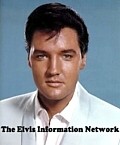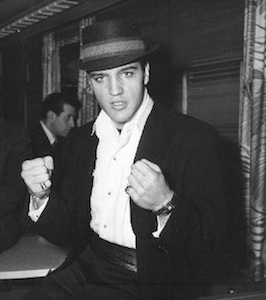Trains, jet planes and morning rain
Paul Simpson investigates Elvis’s cover of Gordon Lightfoot’s most famous song – strangely underrated except by Lightfoot himself
- An EIN Spotlight by Paul Simpson -
|
In this EIN Spotlight respected author Paul Simpson takes a fascinating look at this topic and the importance of fights in Elvis movies...
|
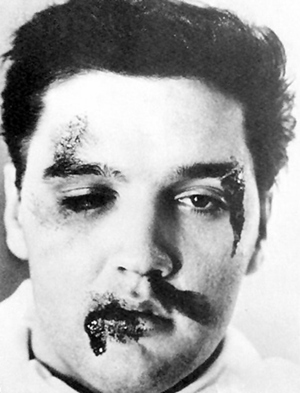 |
Trains, jet planes and morning rain
Paul Simpson investigates Elvis’s cover of Gordon Lightfoot’s most famous song – strangely underrated except by Lightfoot himself
The 1971 album Elvis Now is still treasured by one Elvis fan. Six years ago, in an interview with American Songwriter, Gordon Lightfoot admitted that, in the 1970s, he hadn’t paid much attention to the King’s cover of his classic song Early Morning Rain. “It didn’t really register until after he was gone,” said the Canadian singer/songwriter. “But I loved the job he did on it. I have it right here on my desk. I keep it here. It’s Elvis Now.”
Yet Elvis’s version of Lightfoot’s most famous song remains oddly underrated. Omitted from the Walk A Mile In My Shoes 1970s box set – surely it merited inclusion ahead of the clunky Cindy Cindy! – it gets a so-so write up in Ernst Jorgensen’s seminal Elvis Presley: A Life In Music. While praising the restrained brushes of Jerry Carrigan’s drums, Norbert Putnam’s simple, effective bass line, Charlie McCoy’s evocative harmonica playing and the duelling guitars of James Burton and Chip Young, Jorgensen says the number was “true to its genre but lacked the feel the singer brought to any song when he was at its best.”
After the session on 15 March 1971, in Studio B at Nashville – at which another Lightfoot song For Lovin’ Me, The First Time Ever I Saw Your Face and Amazing Grace were also recorded – Presley was admitted to hospital with secondary glaucoma. Jorgensen’s implication is that his ill-health affected his spirits and performance in Studio B.
Yet Presley’s cover of Early Morning Rain has exerted an enduring appeal, with Lightfoot going as far as to call it his favourite cover of one of his songs. His great regret is that he never met Elvis. He went to one concert hoping to meet up but, as he told American Songwriter: “There were 18,000 people [at the show] that night and, by the time I got back there to meet him, a voice said: ‘Elvis has left the building. I had an appointment! But there were too many people around.”
The making of the song
Early Morning Rain obviously resonated with Presley. The folksy ballad entered his live act, was performed by Elvis for the US TV release of Aloha From Hawaii, and sung at his final concert in Indianapolis on 26 June 1977.
Lightfoot has said the song “rolled off very well”. In 2012, he told Performing Songwriter: “While I was training at Westlake [musical college] in 1956, we’d watch the aircraft taking off and coming in to LAX. The Boeing 707 had just been commissioned. Years later, I went back to those moments to get Early Morning Rain, probably the most important song I’ve ever written.”
Elvis liked to say he would never record a song unless he could add something to it. And after he regained partial creative control of his recording career in 1969, his selection of material was usually more consistent, personal and resonant. So the question was, as he approached Lightfoot’s trademark number, what could he add to it?
It is unclear whether he had heard Lightfoot’s original, released on the eponymous album Lightfoot! in 1966. Judy Collins had released the first version on her Fifth Album in 1965. Presley had certainly heard Peter, Paul and Mary’s cover on an album given to him by Jerry Schilling. (Luckily, this ponderous rendition, which peaked at No91 in the Billboard Hot 100, didn’t deter him.)
The group’s take on Bobby Bare’s classic ballad 500 Miles (which Elvis sang around the piano at Graceland) was much more compelling, driven by Mary Travers’ haunting vocal. Schilling says Elvis also loved Leaving On A Jet Plane. You can hear echoes of the wistfulness of the Peter, Paul and Mary’s 500 Miles and Leaving On A Jet Plane in Presley’s Early Morning Rain.
The Dylan influence
Lightfoot acknowledges Bob Dylan as his great mentor. The reclusive legend covered Early Morning Rain on his 1970 album Self Portrait, a diverse collection of songs which included his interpretations of Blue Moon and Let It Be Me, the latter sung by Presley in Las Vegas, and released on the 1970 live album On Stage.
If you listen to Dylan’s Early Morning Rain – on which Charlie McCoy may well have played harmonica – it’s clear that Presley probably heard this recording. Schilling has admitted: “I don’t know whether he thought he was singing Peter, Paul and Mary or Dylan.” David Stanley has said that his famous stepbrother owned a copy of Dylan’s country-tinged album Nashville Skyline.
In the 1960s, as the movie soundtracks became increasingly formulaic - and perhaps in a bid to remain relevant - Elvis had begun listening to a broader range of music. The leap from country or blues to folk wasn’t especially great, especially as Dylan’s music – in a deliberate riposte to the lavishly produced, psychedelia of the Beatles’ Sgt Pepper – acquired a sparer, countryish feel. On Nashville Skyline, Dylan sang Girl From The North Country with Johnny Cash, Elvis’s old friend from Sun.
Schilling also gave Elvis an album of Dylan covers by black folk singer Odetta. This gift inspired Presley to record a simple, beautiful version of Tomorrow Is A Long Time – which Dylan later cited as his favourite cover of one of his songs. Presley’s rendition was actually released before Dylan’s but shamefully buried as a bonus track on the Spinout album, alongside such gems as Smorgasbord.
By 1970, the King and the Jester - as Don McLean characterised them in American Pie – were not that far apart musically. Indeed, if Nashville Skyline producer Bob Johnson, who claims to have written some songs for Elvis which were credited to his then wife Joy Byers, had had his way the two artists would have shared a studio. “I tried to get them together,” Johnson said, “Dylan would have done it in a second.”
Presley’s interest in folk music stayed strong enough to encourage talk of an Elvis Folk album on similar lines to the inspirational Elvis Country. Early Morning Rain, For Lovin’ Me, I’m Leavin’, I Shall Be Released (arguably the most poignant 48 seconds Elvis ever cut), Where Did They Go Lord? and his sincere, albeit misjudged, cover of The First Time Ever I Saw Your Face, could have formed the nucleus of such a release. Sadly, it never happened.
Versions, interpretations and Little Richard
So in the light of all this, which version of Early Morning Rain did Elvis think he was adding to? We don’t know if he had heard Lightfoot’s original. Peter, Paul and Mary alerted him to the song’s quality without directly influencing him. His interpretation owes a lot to – but is no copy of – Dylan’s cover. Dylan’s version is faithful to the original, recorded at that point in his career when he was trying to sing properly, and is surprisingly lush, with backing vocals and multi-tracked acoustic guitars.
Such fidelity may reflect Dylan’s respect for the songwriter. Once asked to say whether various rivals wrote better songs than him, he dismissed Roger McGuinn and John Lennon, but said: “Hmmm, maybe” when Lightfoot was suggested. The respect is mutual. Lightfoot has said of Dylan: “I love his stuff. But he has different influences than I do. He cites Little Richard and Elvis. I said to him once: “Little Richard and Elvis? In your music? He just gave me one of those looks.”
Elvis had enough power and range to distinguish his version from Peter, Paul and Mary’s and Dylan’s with vocal histrionics. Shrewdly, he chose not to: his vocal is appropriately discreet. Instead, he adjusted the tempo, to create a sweet, natural flow that Peter, Paul and Mary’s cover conspicuously lacked.
Asked, after completing one take, whether he felt the number was too fast, Elvis replied: “I don’t”, quipping: “It’s the difference between a jet and a freight train”. This allusion to the song’s central couplet: “You can’t jump a jet plane, like you can a freight train” provoked some laughter in the studio. The tempo is slower than the Kingston Trio’s rendition yet faster than Jerry Reed’s laborious, lavishly orchestrated, cover which, despite the beauty of Reed’s voice, seems to miss the point. The pace helped Presley and his backing singers – Nashville Edition, Mary and Ginger Holladay and Millie Kirkham – capture the song’s quiet, reflective poetry.
In many of Lightfoot’s greatest songs, he sounds like a modern troubadour, needing only a railway and a guitar to explore the world. The melancholy undertone of the narrator’s adventures – he is, we never forget, destined to keep moving on – is ameliorated by an exhilarating sense of freedom, and an affection for the landscape most eloquently expressed in his epic ballad Canadian Railroad Trilogy.
Regret, cars and planes
Lightfoot’s version of Early Morning Rain is folksy, optimistic and impassioned, without being melodramatic. Presley’s interpretation is different. His voice is permeated by a gentle nostalgic regret that leaves you wondering if he is recalling his breakthrough years between 1954 and 1956 when he criss-crossed America, particularly the South, playing concerts at any venue that would have him.
True, he shared a car – not a train or a plane – with Scotty Moore and Bill Black, but he was constantly on the move, with not much more than a few dollars in his hand and an aching in his heart – for fame and freedom. Or was he looking back even further, to May 1953 when, just 18, he hitched 240 miles from Memphis to Meridian, with ten cents in his pocket rather than a dollar in his hand, to enter a contest at the first Jimmie Rodgers The Father Country Of Music Festival? (He came second.)
The irony is that, as Elvis recorded Early Morning Rain, he was once again criss-crossing America – this time in a jet plane. By the 1970s, his concerts resembled a royal tour, with all the trappings – the entourage, the meetings with local dignitaries, the contractual obligation for graciousness – such a progress implies. As Elvis On Tour magically conveys, when he touched down in towns across America, he did so as a prince from another planet. His inner life is hinted at only in those haunting vignettes of him, alone with his thoughts, gazing out of limousine windows.
All of which may explain why, for me, Early Morning Rain remains one of his most enduring, and just plain listenable, recordings from the 1970s. It’s as if Elvis can foresee the many silver wings on high that lie ahead and his gentle, understated vocal makes the most of the key refrain about freight trains, jet planes and the loss of freedom implied by the jump from train tracks to flight plans.
There’s no big drama here – it is almost the antithesis of the despairing bellow from the heart that powers his 1976 single Hurt – just the King quietly, effectively taking care of business. Some critics don’t like the backing singers, preferring the sparser performance on the FTD release I Sing All Kinds. Yet whatever take you listen to, Elvis’s Early Morning Rain has, in Lightfoot’s words, “a real nice feel to it.”
This article for EIN is an extract by author Paul Simpson from his own book 'Elvis FAQ: All That’s Left To Know About The King Of Hollywood' Click HERE for info
Spotlight written by Paul Simpson (images by Piers Beagley)
-Copyright EIN September 2014
EIN Website content © Copyright the Elvis Information Network.
|
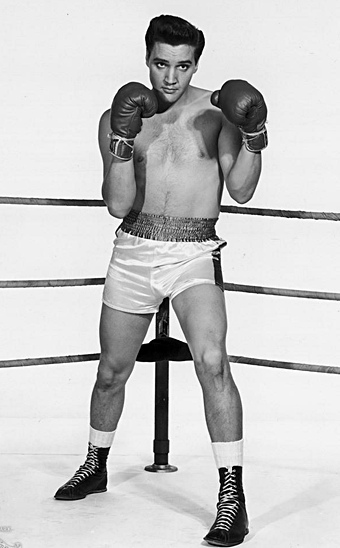 |
Interview with 'Elvis Films FAQ' author Paul Simpson: "Elvis Films FAQ" was reviewed by EIN as one of the best Elvis books published in 2013... "Paul Simpson examines every angle of Elvis’ film career and writes about it in a very engaging and enjoyable style. The real triumph of this book is that it will make you want to watch all of Elvis’ films one more time! Highly recommended."
While Elvis' Hollywood years are full of mystery, and Elvis Films FAQ covers them all! Elvis Films FAQ explains everything you want to know about the whys and wherefores of the singer-actor's bizarre celluloid odyssey; or, as Elvis said, "I saw the movie and I was the hero of the movie."
"Elvis Films FAQ" was without doubt one of the best Elvis books published in 2013 and EIN wanted to know more from its author Paul Simpson.
(Interviews, Source;ElvisInfoNet)
|
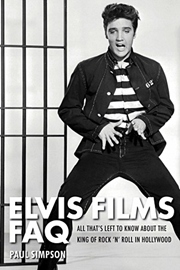 |
'Elvis Films FAQ' Book Review: Elvis' Hollywood years are full of mystery, and supposedly 'Elvis Films FAQ' covers them all! Elvis Films FAQ by author Paul Simpson explores his best and worst moments as an actor, analyses the bizarre autobiographical detail that runs through so many of his films, and reflects on what it must be like to be idolized by millions around the world yet have to make a living singing about dogs, chambers of commerce, and fatally naive shrimps.
After all if Elvis Presley had not wanted to be a movie star, he would never have single-handedly revolutionized popular culture.
Yet this aspect of his phenomenal career has been much maligned and misunderstood – partly because the King himself once referred to his 33 movies as a rut he had got stuck in just off Hollywood Boulevard.
It is a mightly entertaining book - but go here as EIN's Piers Beagley investigates to see whether this new book by author Paul Simpson really answers all the questions you need to know ....
(Book Reviews, Source;ElvisInfoNet)
|
. |
EIN Website content © Copyright the Elvis Information Network.
Elvis Presley, Elvis and Graceland are trademarks of Elvis Presley Enterprises.
The Elvis Information Network has been running since 1986 and is an EPE officially recognised Elvis fan club.
|
|



